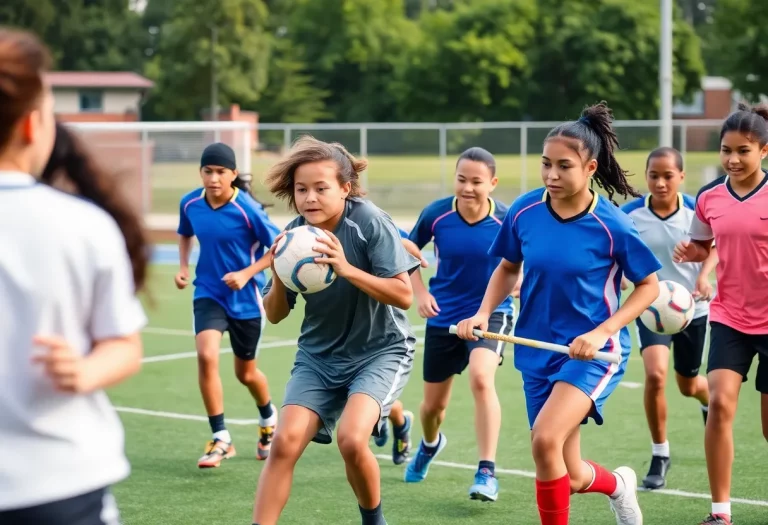News Summary
Jurupa Valley, California, is at the center of a contentious debate after state senator honors transgender athlete AB Hernandez for his achievements in female sports. While celebrated, Hernandez’s participation has raised concerns about fairness in athletics, igniting national discussions. The event, attended by local officials, highlighted the ongoing conflict surrounding gender identity in sports, with potential legal implications and calls for policy changes from political figures. As new guidelines emerge, the debate over inclusion and fairness in women’s athletics continues to evolve.
Jurupa Valley, California: A Controversial Recognition Sparks National Debate
As students across the United States head back to school, the spotlight is once again on the fevered debate surrounding biological males competing in women’s sports. Recently in Jurupa Valley, California, a local state senator honored a transgender high school athlete named AB Hernandez for his impressive achievements in female athletics. This event has ignited fresh discussions about fairness and inclusion in sports.
AB Hernandez: A Star on the Track
AB Hernandez, who competes for Jurupa Valley High School, grabbed headlines after winning multiple girls’ state track and field titles at the end of May. His success includes first place finishes in both the high jump and triple jump events, demonstrating his athletic prowess. However, this thrilling triumph comes amid a growing national debate, as his participation in female competitions has raised eyebrows and sparked concerns among some community members and sports advocates.
Local Honors Amid National Discourse
The recognition event for Hernandez took place in Jurupa Valley and featured local officials, including Mayor Brian Berkson and the Jurupa Valley City Council. Attendees celebrated Hernandez’s determination and hard work, with the mayor presenting him with certificates of recognition for his accomplishments.
State Senator Sabrina Cervantes also praised Hernandez, describing him as an “inspiration” to many, especially given the challenges high-level athletes often face. Interestingly, there was a notable absence of any female athletes from the area who had competed in the girls’ state track and field championships, raising further questions about the implications of this recognition.
Political Allure and Controversies
As the situation unfolded, it drew attention from various political figures, such as California gubernatorial candidate Steve Hilton, who discussed the moral implications of the issue on a recent talk show. Expressing criticism towards the recognition of Hernandez, Hilton is looking to campaign on changing laws that govern gender identity in sports.
The ongoing debate was further fueled by recent postulations from President Donald Trump, who threatened to withdraw federal funding from California unless the state reversed its policies allowing biological males to compete in women’s sports. The California Interscholastic Federation (CIF) reacted by updating its competition policies, allowing female athletes who missed qualifying marks due to male competitors the opportunity to compete in future championships. However, the new guidelines don’t substantially tackle the broader issues surrounding trans athletes in women’s competitions.
The Legal and Ethical Dilemma
Hernandez’s eligibility to compete at the high school level stems from Assembly Bill 1266, also known as the “School Success and Opportunity Act,” passed in 2013. This legislation mandates that students participate in sex-segregated programs according to their self-identified gender. Yet, Hilton has contended that this law may violate segments of the California Constitution, positioning it for potential legal challenges.
Throughout the nation, the Trump administration has pursued broader efforts to restrict transgender participation in athletics, voicing support for policies that ensure only biological females compete in women’s sports. This has raised critical questions about compliance with Title IX regulations. Recent developments have also highlighted similar controversies, such as those involving Lia Thomas, a transgender swimmer whose participation has ignited discussions about fairness in women’s athletics.
The Future of Sports and Inclusion
As sports organizations adjust their guidelines and place greater scrutiny on transgender athletes, the push towards biologically based definitions for eligibility continues. With heightened testing standards and regulatory changes looming, the landscape of women’s sports may be evolving rapidly. The interest in these topics will likely persist as communities weigh the complexities of identity, fairness, and competition.
As the new school year unfolds, the conversations initiated in Jurupa Valley serve as a reminder that the intersection of gender identity and athletics will remain a significant and contentious topic across the nation.
Deeper Dive: News & Info About This Topic
LIVE BALL Resources
Charlottesville Showcases Resilience at Masters Championships
Minnesota High School Girls Tennis Introduces New Class
Wyatt Doyle Named Midwest Members Credit Union Male Athlete of the Month
New Leadership and Talented Additions for Paxton Cross Country
Bow School District’s Controversial Protest Decision
Oregon Education Department Under Fire for Transgender Athlete Policies
Hanover Area High School Tennis Courts Renovated
Kentucky Attorney General Leads Push to Restore Women’s Athletic Achievements Amid Controversy Over Transgender Participation in Sports
Kytana Williamson Breaks Scoring Record at Medomak Valley High School
Alamo Heights City Celebrates Young Golfer’s Big Win
Additional Resources
- WESH
- Wikipedia: Transgender athletes
- AP News
- Google Search: Transgender athletes in sports
- CNN
- Google Scholar: Transgender athletes
- New York Times
- Encyclopedia Britannica: Transgender athletes
- Advocate
- Google News: transgender athletes


